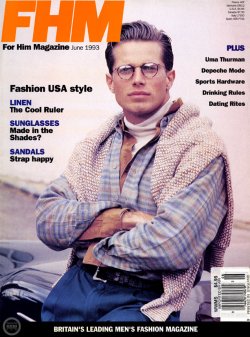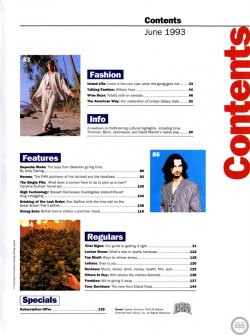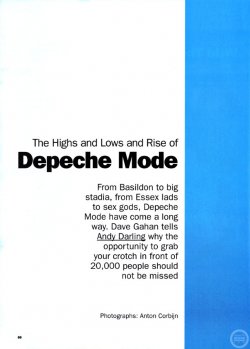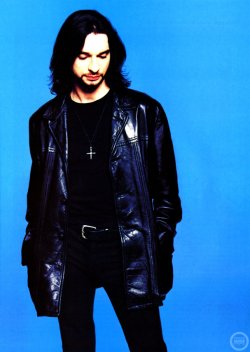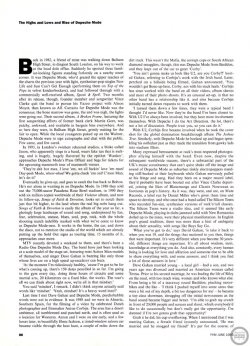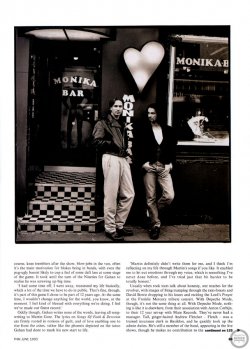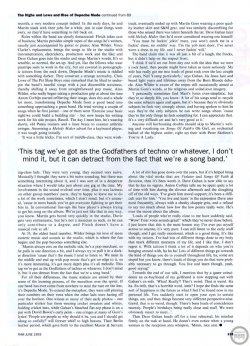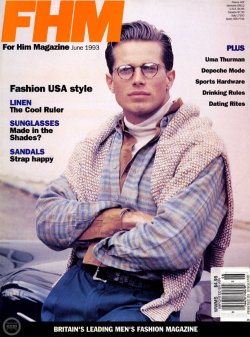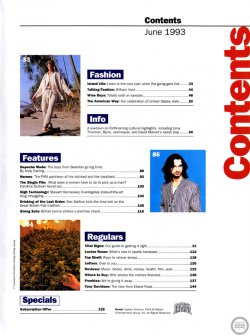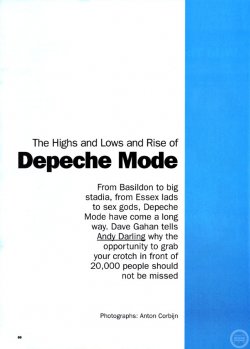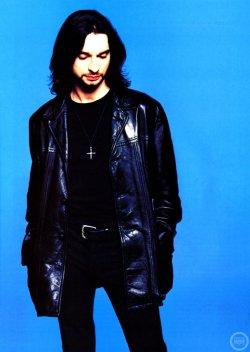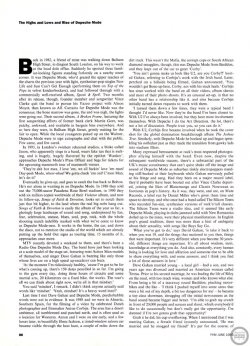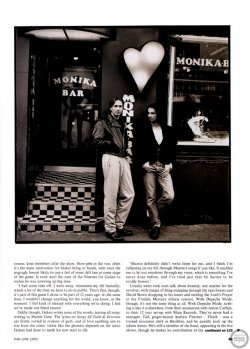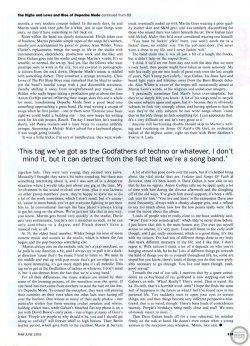You are using an out of date browser. It may not display this or other websites correctly.
You should upgrade or use an alternative browser.
You should upgrade or use an alternative browser.
Depeche Mode The Highs And Lows And Rise Of Depeche Mode (FHM, 1993)
- Thread starter demoderus
- Start date
- Joined
- Aug 15, 2019
- Messages
- 7,493
- Reaction score
- 143
- Points
- 63
Intelligent article, with a lot of input from Dave, focussing up on the inspiration behind Songs Of Faith And Devotion. Dave is rather rambly in this article and in hindsight not everything he says can be relied upon. However there is a lot here about how their work with Anton Corbijn improved their image, and also on the band members' roles within the studio.
Back in 1982, a friend of mine was walking down Balham High Street, in dingiest South London, on his way to work at the local dole office. Suddenly he spotted three familiar-looking figures standing forlornly on a nearby street corner. It was Depeche Mode, who'd grazed the upper reaches of the charts the previous year with light, synthesiser-pop singles 'New Life' and 'Just Can't Get Enough' (performing the on Top of the Pops in velvet knickerbockers), and had followed through with a commercially well-received album, 'Speak & Spell'. Two months after its release, though, founder member and songwriter Vince Clarke quit the band to pursue his Yazoo project with Alison Moyet, then known as Alf. Curtains for Depeche Mode was the consensus; the bone marrow was gone, the end was nigh, the lights were going out. Their second album, 'A Broken Frame', featuring the first songwriting efforts of former bank clerk Martin Gore, was patchy, awkward, and available in bargain bins everywhere. And so here they were, in Balham High Street, grimly waiting for the fair to open. While the local youngsters puked up on the Waltzer, Depeche Mode were to sign autographs and chat with the public. Few came, and few cared.
In 1993, in London's swishest rehearsal studios, a bloke called Jason, who apparently sings in a band, wears fake tan that is melting, and is hugely, hugely flattered by the epithet "Wanker", approaches Depeche Mode's Press Officer and begs for tickets for the upcoming mammoth tour of mammoth venues.
"They're shit hot man, I love 'em, we all fuckin' love 'em man! Day-pesh Mode, whew-whee! We gotta check 'em out! C'mon Man, let's do it!"
Eventually he gives up, and goes to catch the bus back to Bolton. He's not alone in wanting in on Depeche Mode. In 1988 they sold out the 75,000-seater Pasadena Rose Bowl stadium, in 1990 they sold six million copies worldwide of their 'Violator' album, and now its follow-up, 'Songs of Faith & Devotion', looks set to notch them just that bit higher, to the land where the real big nobs hang out. 'Songs of Faith & Devotion' is easily the album of the year so far, a glaringly large landscape of sound and song, underpinned by fun, fear, celebration, unease, blues, soul, pop, rock, with the whole shooting match indelibly marked with what we've come to know as Depeche Mode-ness. It works in the home, the car, and down the disco, not to mention the stadia of the world which are already putting up the Sold Out signs as touring time, 15 months of it, approaches once more.
MTV recently devoted a weekend to them, and there's been a Radio One Depeche Mode Day. The band have just been looking at a scale model of the stage set, featuring mini Action Man models of themselves, and singer Dave Gahan is buzzing like only those whose lives are on a high speed up-escalator can buzz.
"At the moment I'm ridiculously healthy, 'cause I've got to be for what's coming up, there's 150 dates pencilled in so far. I'm going to the gym every day, doing three hours of circuits and some martial arts, 20 kilometres on a fixed bike, the works. The tour's all we can think about right now, we're all in that mindset."
You said 'mindset', I remark. I didn't think anyone actually said words like 'mindset'. "Yeah, mindset! It's a heavy word innit?"
Last time I met Dave Gahan and Depeche Mode, psychobabble words were not in evidence. It was 1988 and we were in Almeria, Southern Spain, for the filming of a video by celebrated Dutch photographer and filmmaker Anton Corbijn. The area has a desert ambience, all tumbleweed and parched earth, and is often used as a location for Westerns. [1] Anton and I were on site early, and a few hours later, in beautifully filmic fashion, a tinted-window saloon car became visible through the heat haze, a couple of miles down the dirt track. This wasn't the Mafia, the corrupt cops or South African diamond smugglers, though, this was Depeche Mode from Basildon, and they leapt out of the car to greet 'Corby'.
"You ain't gonna make us look like U2, are you Corby?" hooted Gahan, referring to Corbijn's work with the Irish band. Later, perched on a hillside being filmed, Gahan announced, "You wouldn't get Bono up here, Corby, not with his stack heels." Corbijn has since worked with the band on all their videos, album sleeves and most of their photo shoots. It's an unusual set-up, in that no other band has a relationship like it, and also because Corbijn initially turned down requests to work with them.
"I turned them down a few times, they were a typical band I thought I'd never like. Now they're the band I've been closest to. With U2 I've always been involved, but they have more involvement themselves. With Depeche I do the Art Direction, the lot, there's not a lot of discussion. People trust you, so you can do it."
With U2, Corbijn first became involved when he took the cover shot for the global domination breakthrough album 'The Joshua Tree'. Similarly, with Depeche Mode he hooked up and began sprinkling his oofledust just as they made the transition from gawky lads into stadium fillers.
Many expressed bemusement at rock's most respected photographer allying himself with the band. Even now, despite the subsequent worldwide success, there's a substantial part of the UK's music constituency that can't quite shake off the image and sound of Depeche Mode as suburban tinkly electropoppers standing stiff-backed at their keyboards while Gahan nervously pulled at his fringe and sang. Had they been on a major record label, they'd probably have been booted out after Vince Clarke departed, joining the likes of Blancmange and Classix Nouveaux as footnotes in pop's history. As it was, they were, and are, on Mute Records, a label run by Daniel Miller who's given them time and space to develop, and who once had a band called The Silicon Teens who recorded fun-size, synthesiser versions of rock'n'roll classics. The Silicon Teens were a studio idea, and it seemed like early Depeche Mode, playing in clubs jammed solid with New Romantics dolled up to the nines, were their physical manifestation. In English pop's grand tradition, there was more than a hint of ambiguity about their sexuality, with songs like 'Boys Say Go'.
"What you've got to do," says David Gahan, "is take it back to when you was 19, and the things that mattered to you then, things that were important. It's very different when you become 30 years old, different things are important. It's all about wisdom, innit, knowledge at everything you do. And also, constantly, every human being is looking for love and affection and someone else to be able to share everything with, and some answers, and I think you find a lot of those answers in love."
Dave Gahan married young - a local girl - had a son, and two years ago was divorced and married an American woman called Teresa. Prior to his second marriage, he was leading the life of Riley on the road, with too much wine, women and who knows what else. From being a bit of a tearaway around Basildon, pinching motorbikes and the like - "I think I pushed myself into some areas that were a bit out of my depth, a bit too dangerous for me" - he became a top class showman, shrugging off the initial nervousness as the band sound became bigger and better. "I'm able to grab my crotch in front of 20,000 people and scream and shout, which everybody'd like to do occasionally but don't really get the opportunity. I'm damned if I'm not gonna grab that opportunity!"
Grab it he did, his cup overflowing. When I mentioned that I was meeting Gahan, a female friend instantly announced, "He was married and he snogged my friend!" It's par for the course, of course, knee tremblers after the show, blow-jobs in the van, often it's the main motivation for blokes being in bands, with even the pug-ugly bassist likely to cop a feel of some daft lass at some stage of the game. It took until the turn of the Nineties for Gahan to realise he was screwing up big time.
"I had some time off, I went away, reassessed my life basically, which a lot of the time we have to do in public. That's fine, though, it's part of this game I chose to be part of 12 years ago. At the same time, I wouldn't change anything for the world, you know, at the moment I feel kind of blessed with everything we're doing. I feel we've made our finest record." [2]
Oddly though, Gahan writes none of the words, leaving all songwriting to Martin Gore. The lyrics on 'Songs Of Faith & Devotion' are firmly rooted in notions of guilt, and of love enabling one to rise from the ashes, rather like the phoenix depicted on the tattoo Gahan had done to mark his new start to life.
[1] - From the description the video was probably for 'Pimpf' on the 'Strange' video collection (1988)
[2] - A lot of the views Dave expresses in this article are ones that he would later step back from, on the grounds of his personal problems at the time. This comment is the exception - many times since, Dave has said how 'Songs Of Faith And Devotion' is one of his favourites, if not the favourite album.
Last edited:
- Joined
- Aug 15, 2019
- Messages
- 7,493
- Reaction score
- 143
- Points
- 63
"Martin definitely didn't write them for me, and I think I'm reflecting on my life through Martin's songs if you like. [1] It enabled me to let out emotions through my voice, which is something I've never done before, and I've tried just that bit harder to be totally honest."
Usually when rock stars talk about honesty, one reaches for the revolver, with images of Sting trampling through the rain-forests and David Bowie dropping to his knees and reciting the Lord's Prayer at the Freddie Mercury tribute concert. With Depeche Mode, though, it's not the same thing at all. With Depeche Mode, nothing is like it is elsewhere, from their association with Anton Corbijn, to their 12 year set-up with Mute Records. They've never had a manager. Tall, ginger-haired Andrew Fletcher - Fletch - was a trained insurance clerk in Basildon, and he quickly took up the admin duties. He's still a member of the band, appearing in the live shows, though he makes no contribution to the records, a very modern concept indeed. In the early days, he and Martin stuck with their jobs for a while, just in case things went awry, so they'd have something to fall back on.
Roles within the band are clearly demarcated: Fletch takes care of business; Martin provides simple tapes of the songs he's written, usually just accompanied by guitar or piano; Alan Wilder, Vince Clarke's replacement, brings the songs to life in the studio with instrumentation, electrickery, production work and the like, and Dave Gahan goes into the studio and sings Martin's words. It's so sensible, so normal, the set-up. And yet, like the fellows who wear pinstripe suits to work in the city, but are covered in pornographic tattoos from the neck down, Depeche Mode's music is riddled with something darker. They construct a strange normality. Chris Lowe of the Pet Shop Boys once remarked that he liked to underpin the band's tuneful songs with a just discernible noisiness, thereby shifting it away from straightforward pop music. Alan Wilder, who really began taking a production grip at about the time Anton Corbijn started refiltering their image, does this and a whole lot more, transforming Depeche Mode from a good band into something approaching a great band. He tried writing a couple of songs when he first joined - one of them went "Exercise your basic right / we could build a building site" [2] - but now keeps his writing work for his side project, Recoil. The day I meet him, he's wearing shorts, old Puma trainers and a knee brace to counter arthritic twinges. Answering a Melody Maker advert for a keyboard player, it was tough going initially.
"It was a little tricky. I'm sort of middle-class, they were working-class lads. They were young, they seemed very naive. Musically I thought they were a bit naive sounding, but there was something interesting about it, and I was sort of in a desperate situation where I would take just about any gig at the time. My involvement in the sound evolved over time, plus it was laziness on other group members' parts, they're happy to leave me to do a lot of the work sometimes, which I don't mind, but it's unusual, 'cause in most bands you've got everyone fighting to get their bits in. In conventional line-ups the bass player's always trying to get his song on the album. We're just not like that in any way, you know. Martin gets bored very quickly in the studio, Dave gets very enthusiastic, but he's not a musician as such, so he can only contribute to a degree, and Fletch doesn't have a musical role at all."
At 33, the oldest band member, Wilder brings his love of more esoteric music and sounds to the studio, which is where the fun begins and the pop becomes something else.
"Martin always errs on the melodic side, he's a pop merchant, so he pulls in one direction a bit, and I always try to pull it in a darker direction 'cause that's the music I tend to listen to. We meet in the middle and end up with pop music that's got an edge to it, so it's more interesting, it's got more depth plus it's all melodic. This tag we've got as the Godfathers of techno or whatever, I don't mind it, but it can detract from the fact that we're a song band."
For all their differences, the music makers are united by their sense of the learning process, of the marathon over the sprint. If one band has ever come from nowhere to steal the race on the line, it's Depeche Mode. To extend the metaphor, they were still pinning their numbers on their vests when the other lads were haring off over the horizon. One winces at many of their early photos - one particular stinker has them wearing cricket sweaters and whites, holding cricket bats [3], while Gahan's bleached flat-top phase is on a par with David Bowie's curly perm - one cringes at many of Gore's lyrics! "People are people so why should it be, you and I should get along so awfully?" will forever whiff to high heaven. Their Berlin leather period, which gave birth to the excellent 'Master & Servant' track, eventually ended up with Martin Gore wearing a poor quality leather skirt and S&M gear, and was similarly discomfiting for those who sensed there was talent beneath the tat. [4] Dave Gahan later told Melody Maker that he'd never considered wearing one himself:
"You must be fuckin' jokin' mate, you won't catch me in a fuckin' dress, no soddin' way. I'm the yob next door, I've never worn a dress in my life, and I never fuckin' will." [5]
Usually when rock stars talk about honesty, one reaches for the revolver, with images of Sting trampling through the rain-forests and David Bowie dropping to his knees and reciting the Lord's Prayer at the Freddie Mercury tribute concert. With Depeche Mode, though, it's not the same thing at all. With Depeche Mode, nothing is like it is elsewhere, from their association with Anton Corbijn, to their 12 year set-up with Mute Records. They've never had a manager. Tall, ginger-haired Andrew Fletcher - Fletch - was a trained insurance clerk in Basildon, and he quickly took up the admin duties. He's still a member of the band, appearing in the live shows, though he makes no contribution to the records, a very modern concept indeed. In the early days, he and Martin stuck with their jobs for a while, just in case things went awry, so they'd have something to fall back on.
Roles within the band are clearly demarcated: Fletch takes care of business; Martin provides simple tapes of the songs he's written, usually just accompanied by guitar or piano; Alan Wilder, Vince Clarke's replacement, brings the songs to life in the studio with instrumentation, electrickery, production work and the like, and Dave Gahan goes into the studio and sings Martin's words. It's so sensible, so normal, the set-up. And yet, like the fellows who wear pinstripe suits to work in the city, but are covered in pornographic tattoos from the neck down, Depeche Mode's music is riddled with something darker. They construct a strange normality. Chris Lowe of the Pet Shop Boys once remarked that he liked to underpin the band's tuneful songs with a just discernible noisiness, thereby shifting it away from straightforward pop music. Alan Wilder, who really began taking a production grip at about the time Anton Corbijn started refiltering their image, does this and a whole lot more, transforming Depeche Mode from a good band into something approaching a great band. He tried writing a couple of songs when he first joined - one of them went "Exercise your basic right / we could build a building site" [2] - but now keeps his writing work for his side project, Recoil. The day I meet him, he's wearing shorts, old Puma trainers and a knee brace to counter arthritic twinges. Answering a Melody Maker advert for a keyboard player, it was tough going initially.
"It was a little tricky. I'm sort of middle-class, they were working-class lads. They were young, they seemed very naive. Musically I thought they were a bit naive sounding, but there was something interesting about it, and I was sort of in a desperate situation where I would take just about any gig at the time. My involvement in the sound evolved over time, plus it was laziness on other group members' parts, they're happy to leave me to do a lot of the work sometimes, which I don't mind, but it's unusual, 'cause in most bands you've got everyone fighting to get their bits in. In conventional line-ups the bass player's always trying to get his song on the album. We're just not like that in any way, you know. Martin gets bored very quickly in the studio, Dave gets very enthusiastic, but he's not a musician as such, so he can only contribute to a degree, and Fletch doesn't have a musical role at all."
At 33, the oldest band member, Wilder brings his love of more esoteric music and sounds to the studio, which is where the fun begins and the pop becomes something else.
"Martin always errs on the melodic side, he's a pop merchant, so he pulls in one direction a bit, and I always try to pull it in a darker direction 'cause that's the music I tend to listen to. We meet in the middle and end up with pop music that's got an edge to it, so it's more interesting, it's got more depth plus it's all melodic. This tag we've got as the Godfathers of techno or whatever, I don't mind it, but it can detract from the fact that we're a song band."
For all their differences, the music makers are united by their sense of the learning process, of the marathon over the sprint. If one band has ever come from nowhere to steal the race on the line, it's Depeche Mode. To extend the metaphor, they were still pinning their numbers on their vests when the other lads were haring off over the horizon. One winces at many of their early photos - one particular stinker has them wearing cricket sweaters and whites, holding cricket bats [3], while Gahan's bleached flat-top phase is on a par with David Bowie's curly perm - one cringes at many of Gore's lyrics! "People are people so why should it be, you and I should get along so awfully?" will forever whiff to high heaven. Their Berlin leather period, which gave birth to the excellent 'Master & Servant' track, eventually ended up with Martin Gore wearing a poor quality leather skirt and S&M gear, and was similarly discomfiting for those who sensed there was talent beneath the tat. [4] Dave Gahan later told Melody Maker that he'd never considered wearing one himself:
"You must be fuckin' jokin' mate, you won't catch me in a fuckin' dress, no soddin' way. I'm the yob next door, I've never worn a dress in my life, and I never fuckin' will." [5]
[1] - Whether or not this is the case has been confusing onlookers for years. In a drunken moment in 1994 Martin confided in Dave that he felt he got his songs from God, but had to channel them through Dave. Martin has maintained that he cannot get into another person's mind enough to write from their point of view (the author of this article agrees), and Dave has generally gone along with that view.
The author of this article struggles to support the opposite view.Depeche Mode - Common Synths (NME, 1997)
Common Synths [NME, 12th April 1997. Words: James Oldham. Artwork: Paul McCaffrey.]dmremix.pro
[2] - That quote (from 1984's 'If You Want') "still prompts a pained expression and a shake of the head from the musician", says Steve Malins in his biography.Depeche Mode - In The Mode For Love (Time Out, 2001)
In The Mode For Love [Time Out, 4th April 2001. Words: Sat Bisla. Pictures: Uncredited.] Unusual article using Depeche's releases as snapshots to trace the band's history while Dave reflects. Factually, there's nothing wrong with it, but Dave's musings colour the article a bit too heavily, and...dmremix.pro
[3] - Oh, would that be this picture by any chance?

[4] - Don't be misled - while the author extols the songwriting virtues of their 'Berlin period', the prize turkey he has just quoted ('People Are People') was written at the same time.
[5] - This is from Melody Maker, 10th March 1990.
Depeche Mode - Depeche Mode Hip It Up And Start Again (Melody Maker, 1990)
Depeche Mode Hip It Up And Start Again [Melody Maker, 10th March 1990. Words: Jon Wilde. Pictures: Uncredited.]dmremix.pro
Last edited:
- Joined
- Aug 15, 2019
- Messages
- 7,493
- Reaction score
- 143
- Points
- 63
The band claim that it was all just a bit of a laugh, the frocks, but it didn't help on the respect front.
"I think if we'd set out from day one with the idea that we were a rock band, then people might have taken us more seriously. My wife has really got me into loads of great rock over the last couple of years, Neil Young particularly," says Gahan, his Jesus hair and beard light years and lifetimes away from the Born Blonde debacle. Alan Wilder is aware of the snipes still occasionally aimed at Martin Gore's words, at his religious and soiled-love imagery.
"I personally sometimes find Mart's lyrics over-simplistic, but they're so deeply felt, you know. A lot of his songs tend to recycle the same subjects again and again, but it's because they're obviously subjects he feels very strongly about, and having spoken to him he says they're the only subjects he can write songs about 'cause they're the only things he feels something for. I can appreciate that. It's a very difficult art and he's very good at it."
Anyone still harbouring doubts should skip to Martin's writing and vocalising on 'Songs Of Faith''s 'Oh Girl' an orchestral ballad of the highest order, right up there with Peter Skellern's 'You're A Lady'. [6]
A lot of shit has gone down over the years, but if it's helped bring about the vital works that are 'Violator' and 'Songs Of Faith & Devotion', then it's been worth it. Dave Gahan is now able to say that he has no regrets. Anton Corbijn tells me he spent quite a lot of time with him during the divorce aftermath and the sloughing off of the old ways. "I've given him moral support; it's been a difficult year for him." "You live and learn" is the expression Dave uses most frequently, always with a cheeky chappie grin, and a refusal to say too much about how low the low points really were. He's over the moon about the album.
"Loads of people who're really close to me have suddenly said, 'Wow! Your voice sounds great!' which they've never done before. I just know that this is the most honest way I've ever put myself across to anyone, it's very pure. I can still listen to the early stuff though, and I get really emotional, which is a good thing. It's like with my tattoos, I've had lots of different things done to my body that mark different moments of my life, and I like that. I don't regret it. With tattoos I think a lot of it depends on who you're hanging around with, ha ha ha! Lots of different things go towards the kind of things you do to yourself throughout life, ha, some are stupid but you know, there's loads of things you do that were probably necessary to go through. You live and learn though, yeah, good saying!"
Towards the end of our talk, I mention that by a queer coincidence an ex-boyfriend of my girlfriend is now stepping out with Gahan's ex-wife. "What! Really? That's weird. That is weird. Ha ha. Ex wife, that's a horrible word, innit? I hope she finds the same sort of happiness in the future as what I feel I've found now in my personal life. You suddenly start to open your eyes to certain things, um, and them things become very different perspective-wise. Gawd, that is so weird, though. There's been loads of coincidences recently. People's birthdays being really close and stuff. We were obviously meant to meet..."
Then Dave Gahan heads off for a tour rehearsal, his mindset firmly on the task at hand. He doesn't even notice when a young woman in the reception area whispers, "Mmm, nice arse."
"I think if we'd set out from day one with the idea that we were a rock band, then people might have taken us more seriously. My wife has really got me into loads of great rock over the last couple of years, Neil Young particularly," says Gahan, his Jesus hair and beard light years and lifetimes away from the Born Blonde debacle. Alan Wilder is aware of the snipes still occasionally aimed at Martin Gore's words, at his religious and soiled-love imagery.
"I personally sometimes find Mart's lyrics over-simplistic, but they're so deeply felt, you know. A lot of his songs tend to recycle the same subjects again and again, but it's because they're obviously subjects he feels very strongly about, and having spoken to him he says they're the only subjects he can write songs about 'cause they're the only things he feels something for. I can appreciate that. It's a very difficult art and he's very good at it."
Anyone still harbouring doubts should skip to Martin's writing and vocalising on 'Songs Of Faith''s 'Oh Girl' an orchestral ballad of the highest order, right up there with Peter Skellern's 'You're A Lady'. [6]
A lot of shit has gone down over the years, but if it's helped bring about the vital works that are 'Violator' and 'Songs Of Faith & Devotion', then it's been worth it. Dave Gahan is now able to say that he has no regrets. Anton Corbijn tells me he spent quite a lot of time with him during the divorce aftermath and the sloughing off of the old ways. "I've given him moral support; it's been a difficult year for him." "You live and learn" is the expression Dave uses most frequently, always with a cheeky chappie grin, and a refusal to say too much about how low the low points really were. He's over the moon about the album.
"Loads of people who're really close to me have suddenly said, 'Wow! Your voice sounds great!' which they've never done before. I just know that this is the most honest way I've ever put myself across to anyone, it's very pure. I can still listen to the early stuff though, and I get really emotional, which is a good thing. It's like with my tattoos, I've had lots of different things done to my body that mark different moments of my life, and I like that. I don't regret it. With tattoos I think a lot of it depends on who you're hanging around with, ha ha ha! Lots of different things go towards the kind of things you do to yourself throughout life, ha, some are stupid but you know, there's loads of things you do that were probably necessary to go through. You live and learn though, yeah, good saying!"
Towards the end of our talk, I mention that by a queer coincidence an ex-boyfriend of my girlfriend is now stepping out with Gahan's ex-wife. "What! Really? That's weird. That is weird. Ha ha. Ex wife, that's a horrible word, innit? I hope she finds the same sort of happiness in the future as what I feel I've found now in my personal life. You suddenly start to open your eyes to certain things, um, and them things become very different perspective-wise. Gawd, that is so weird, though. There's been loads of coincidences recently. People's birthdays being really close and stuff. We were obviously meant to meet..."
Then Dave Gahan heads off for a tour rehearsal, his mindset firmly on the task at hand. He doesn't even notice when a young woman in the reception area whispers, "Mmm, nice arse."
[6] - The correct title of the song is 'One Caress'.
Last edited:
- Joined
- Aug 15, 2019
- Messages
- 7,493
- Reaction score
- 143
- Points
- 63

